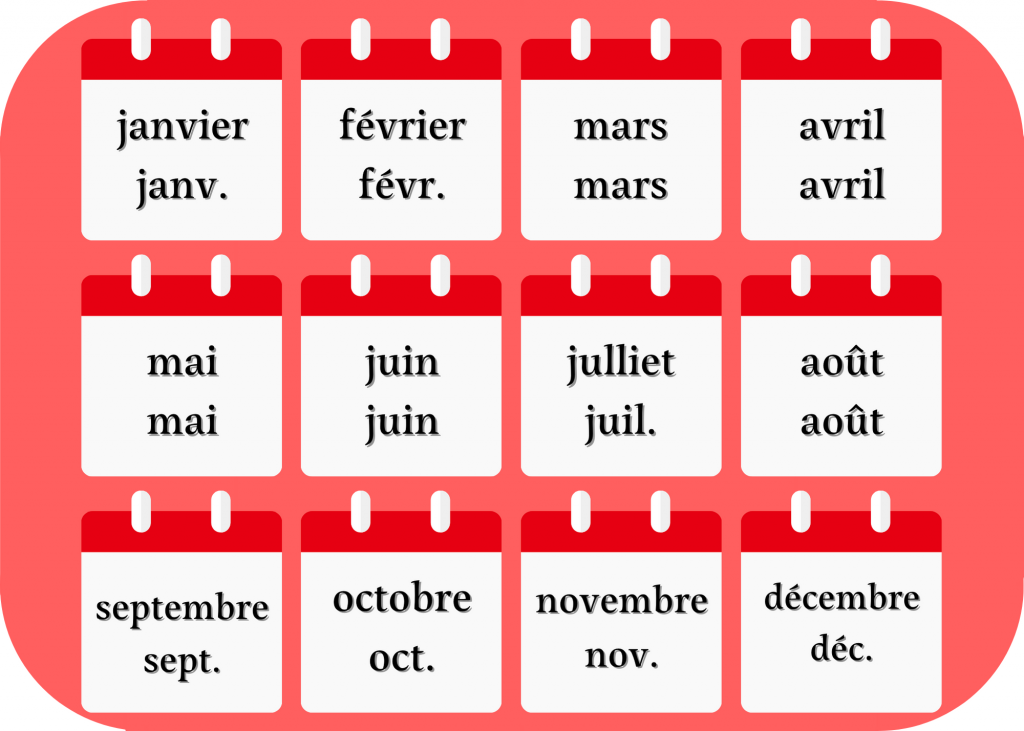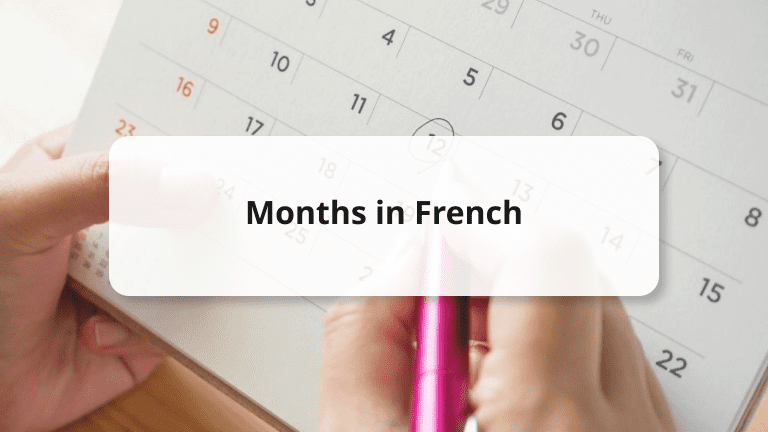Whether you are in a french speaking country as a student, businessman or woman, traveler, or tourist, learning how to say months in French, as well as time in French, would be very helpful and important for you to be able to communicate.
In this article, you will learn the months in french, how to write them, their pronunciation and how to use them in conversations, as well as some interesting facts about these months. Do you know that french months are never capitalized, as they are in English? Yes, you must write them in lowercase.
Before we dive into it, kindly check our blog for tips to learn French which will help you in understanding the language easily.

Learn the Months in French
First of all, let us learn how to say the word ‘month’ in french. If you want to say ‘month’ you say ‘mois’. Mois is pronounced /mwa/ or /mwɑ/ according to the International Phonetic Alphabet (IPA). Don’t worry about the pronunciation, a video is at the end of this article to help you with pronouncing these words. Also, you should be careful with this word as it has the same pronunciation as moi, which means ‘me’ in French. Such similarities do occur in french words and you need to pay attention. One of the best guides to not make such mistakes is by using French to English apps to translate.
There are interesting facts to know about french months. The first is that all french months are not capitalized like in English unless they are used at the beginning of a sentence. Another one is that French months are all masculine. Don’t worry we will write about Masculine and Feminine nouns in French very soon.
In the table below, we are going to list the months in French, their short forms, and their IPAs. We have also included their English spellings.
| English months | French months | short form | IPA |
|---|---|---|---|
| January | janvier | janv. | /ʒɑ̃vje/ |
| February | février | févr. | /fevʀije/ |
| March | mars | mars | /maʀs/ |
| April | avril | avril | /avʀil/ |
| May | mai | mai | /mɛ/ |
| June | juin | juin | /ʒɥɛ̃/ |
| July | juillet | juil. | /ʒɥijɛ/ |
| August | août | août | /u(t)/ |
| September | septembre | sept. | /sɛptɑ̃bʀ/ |
| October | octobre | oct. | /ɔktɔbʀ/ |
| November | novembre | nov. | /nɔvɑ̃bʀ/ |
| December | décembre | déc. | /desɑ̃bʀ/ |
After learning the months in French in this article, don’t forget to read about Days of the Week in French. You would surely need to know them as well.
Now, let us dive deep into each and explain how they come into existence, their pronunciation, and give examples of how to use them.
janvier – January
Janvier is a month that starts a new year. It driver its name from a deity called Janus who was reported to have two faces looking sideways, one looking back for events in the past and the other looking forward to symbolizing the future for hope. Janvier has 31 days and this month symbolizes, a starting point for a new beginning.
Example: Je commence l’école en janvier
Translation: I am starting school by January
février – February
février is the next month after janvier. It’s a month dedicated for purification, and this name was gotten from the Roman festival of two key dieties, Lupercus and Februtis. Février has 28 days but can also be 29 if its a leap year i.e a year number divisible by 4. This happens every 4 years. By having either 28 or 29 days, février is considered as the shortest month of the year.
Example: Le 14 février, c’est la Saint-Valentin
Translation: February 14 is Valentine’s Day
mars – March
March was named after a God of war called Mars. It’s the 3rd month of the year. One interesting fact about March is that it is in this month that animals start waking up from hibernation. It also has 31 days.
Example: Je suis allé à Paris en mars
Translation: I went to Paris in March
avril – April
April is gotten from the ancient Greek goddess of sexual love and beauty, Aphrodite. This goddess was historically identified with the god Venus by the Romans. This is the month when spring shall return with warm temperatures, blooming flowers, and many outdoor festivals. One of the festivals celebrated in this month is April Fool’s Day, which happens on the 1st of April. There are 30 days in this month. April is also the month for Easter when Christians celebrate the resurrection of Jesus Christ.
Example: Je suis né en avril
Translation: I was born in April
mai – May
May’s name comes from the Italian Goddess of spring, Maia, who was the wife of Vulcan. May is known as a month of transition, wherein if you live in the northern hemisphere, the fresh cold wind will be winding up and the early spring rain will be settling in. Talking about the zodiac sign, May has two. Taurus and Gemini. Mai has 31 days
Example: Elle s’est mariée en mai
Translation: She got married in May

juin – June
From Mai we move towards the Goddess Juno, the wife (and sister) of Jupiter for whom June was named. This goddess was the most important goddess in Rome. Some interesting facts about this month include the fact that it is international men’s month. June is the month with the longest daylight hours of the year in the Northern Hemisphere, and the shortest of the year in the Southern Hemisphere. Also, in both common and leap years, no other month begins on the same day of the week as June. Weird, isn’t it? June has 30 days
Example: Juin est le 6ème mois de l’année
Translation: June is the 6th month of the year
juillet – July
The 3rd quarter of the Wheel of the Year begins in July. The month’s name came as an honour to Julius Caesar. A brilliant military strategist who brought Rome from a republic to being an Empire. Interesting facts about this month are that it is the 2nd summer month after June. On average, it is the warmest month in the Northern Hemisphere. July is also sometimes called the ‘hay month’ because, during this month, the grass dries out due to a lack of rain and can be made into hay. Also, quite a number of countries such as the United States, Belarus, Venezuela, Argentina, and Belgium got their independence this month. July has 31 days.
Example: Je me déshydrate davantage en juillet à cause de la chaleur
Translation: I get more dehydrated in July because of the heat

août – August
Similar to July, and now in the middle of summer, we have August. This name is also gotten from another Roman leader called Augustus Caesar. While not really being the “fighting type” Augustus managed to expand the Roman Empire into Egypt, Spain, and the Balkans. August is popularly known as harvest month, and its zodiac sign is Leo and Virgo. There are some holidays in August among which include Women’s Equality Day (26th August) and National Friendship Day (1st August). August has 31 days
Example: L’anniversaire de mon père est le 12 août
Translation: My father’s birthday is August 12
septembre – September
September is the 9th month of the year. The name comes from a word meaning seven because it was originally the 7th month on the calendar. Virgos and Libras celebrate birthdays in September and in the United States it is designated as the National All-American Breakfast Month (bacon and eggs anyone?). September has 30 days
Example: L’école reprend en septembre
Translation: School resumes in September
octobre – October
The name for the month originates from the Latin word “octō”, which means “eight”. In the Roman calendar, October was the 8th month of the year. When January and February were added to the calendar after the Julian calendar reform, October became the 10th month of the year as we know it now. Every year, October ends on the same day as February. So yes, in 2022, February ended on a Saturday and so will October. October has 31 days
Example: Le prêt est dû en octobre
Translation: The loan is due by October
novembre – November
November, the 11th month of the year, has 30 days and marks the beginning of the winter holiday season for most folks, even if the winter solstice doesn’t occur until late December. Some of the celebrations in this month include Veterans Day celebrated in the United States and Remembrance Day celebrated in Canada on the 11th of November.
Example: L’équipe commencera le tournage du film en novembre
Translation: The team will start shooting the film by November
décembre – December
Meanwhile, number 12 for our current calendar system is the month of December. This month represents completions and new beginnings. December is also a time when numerous holidays and festivals occur around the world. Three of the most notable celebrations in this month is the Christmas (December 25), Boxing Day (26th December) as well as New Year’s Eve which is the last day of the year (31 December). Sagittarius and Capricorn have their birthdays in this month. It has 31 days.
Example: C’est le 25 décembre, joyeux Noël!!!
Translation: Its December 25, happy Christmas!!!
FAQs
The 12 months in French are: janvier (January), février (February), mars (March), avril (April), mai (May), juin (June), juillet (July), août (August), septembre (Septembre), octobre (October), november (November), and décembre (December).
French months are in a singular form and do not pluralize at all. You don’t actually pluralize them at all! Their number is determined by context. For instance, if I want to say that my brother comes to visit every October, I don’t say tous les octobres, but either au mois d’octobre (in the month of October) or en octobre (in October).
However, french days of the week can be pluralized. There are some rules with the pluralization of days of the week but it’s a bit complicated. But the good news is, you can’t make a mistake if you use either a singular or plural. Also, If you want to say “every [day of the week]”, you do it like so: tous les + [day of the week]. The day of the week and its article are always in their plural form.
Example: La ludothèque est ouverte tous les mercredis.
Translation: The games library is open every Wednesday
When is your next anniversary?
In this article, we discussed the months in French, their origin, pronunciation, examples of how they can be used in a sentence, as well as some interesting facts about these months, one of which include the fact that they are never capitalized except when they begin a sentence, unlike their English version. To develop your French communication skills, check out AmazingTalker to connect with online French tutors who can assist you in learning the French language easily, efficiently, and quickly, and you would be speaking French like a native in a short time.

















